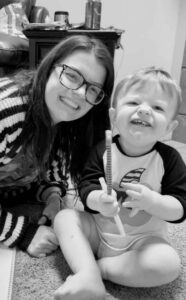Jasmine

Disclaimer: The following article mentions the topic of suicide or other sensitive subjects, which may trigger negative thoughts and feelings for those currently suffering or still recovering from a mental or mood disorder. Reader discretion is advised.
My name is Jasmine, and I have a one-year-old son named Oliver. Growing up, I always
loved kids. I figured I would be a parent one day and was surprised when I became
pregnant so quickly after trying.
Throughout my entire pregnancy, people used scare tactics a lot by saying things like,
“wait until he doesn’t sleep” or “your freedom is over.” I knew they were expecting me to
laugh or smile at their jokes.
I began developing symptoms of postpartum depression when I found out I was
pregnant. I didn’t feel like celebrating my pregnancy because I felt like the people
around me were right and my life was over. The thought of baby showers and maternity
pictures was something I couldn’t stomach. I felt so isolated and alone, and I also had
severe morning sickness. I was scared I was going to lose Oliver. I was scared of what
life was going to be like. I was scared I couldn’t do it.
After my son was born, I thought he would die of SIDS, that he would be kidnapped, or
would be a victim of child traffickers. My husband and I both took shifts watching him
around the clock for 3 months. I was having full blown night terrors that I was burying
my son alive in the backyard and would dig around the backyard to check. A lot of the
times I was asked what was wrong, but I couldn’t bring myself to tell anyone. I didn’t
know how to explain it.
My perinatal mood disorder was debilitating. It made my life unmanageable, chaotic,
and out of control. I woke up shaking and enraged for no reason at all. I thought I failed
my son by being his mom and that he would be better off without me. I also thought my
whole family would be better off without me. I told myself this so often I believed it and
focused on self-harm a lot.
I sought treatment through a postpartum clinic called Serenity, and they were amazing
to work with. I am here to tell you it gets better and that you have so much to offer.
You’re worthy of taking up that space. Motherhood is hard, but please keep fighting the
good fight. There is a whole army of moms rooting for you!
Thank you, Emily, for making me feel I wasn’t alone. You’re helping so many women.
